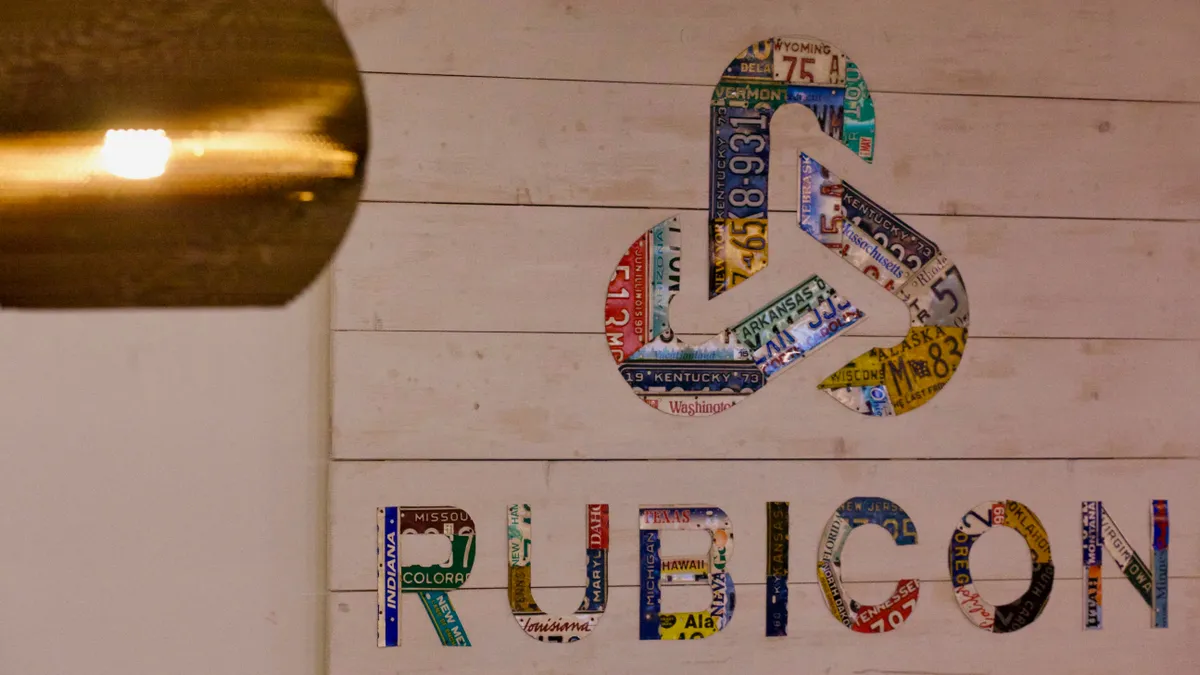Rubicon Global has been in business for over a decade and has received more than its fair share of press coverage, but it's still not uncommon to meet people who don't quite understand what the "technology company" does. If its latest play works, those questions may soon be answered once and for all.
Detractors like to say Rubicon is just another broker (and the company has acquired multiple brokers in the past) but its leadership has consistently eschewed that label. The Atlanta-based company prefers to talk about itself in broader terms, citing a "mission to end waste" and reshape how the industry operates. Now, after years of tough competition with major agglomerates, it appears Rubicon may be leaning into the technology focus as a way of redefining what successful disruption of that status quo could mean.
"[Software as a subscription] is what's going to be the predominant focus of how we grow over the future," CEO Nate Morris told Waste Dive earlier this month at WasteExpo, citing an accumulation of scale, relationships and data as key assets to leverage. "That's going to be a big bulk of our growth, but also is really going to be the future of our industry and how we are going to be judged in a public or private market."
According to Morris, this subscription business is targeted to comprise more than 50% of Rubicon's revenue in the next five years, including the company's expanding smart cities line and more.
True to its pattern of financial opacity, Rubicon declined to confirm what percentage of its revenue is currently subscription-based, preferring to focus the interview around reclaiming ownership of the "technology company" label. The growing use of the term by companies such as Waste Management hasn't gone unnoticed — nor have perceived implicit references to Rubicon's efforts to upend the sector.
"Part of the beauty of the business is it hasn't had a disruptor," said Waste Management CEO Jim Fish during the WasteExpo investor summit, reflecting on his career to date. "We have not had somebody come in that is a Jeff Bezos that disrupts the entire space."
Still, the Rubicon team said it felt some sense of vindication to hear more discussion around the need for technological advancement in the industry: Fish said the industry is closer to a flip phone than an iPhone on the spectrum of progress. Even so, Rubicon remains unconvinced by what it sees as surface-level efforts.
"I think every American company today wants to be a technology company. The big autos are talking about becoming technology and mobility companies," said Chief Strategy Officer Michael Allegretti. "Everyone wants to be, but it's more than office layouts. It comes to building tech products, and that's what we are focused on."
"If you are a technology company, how much of your revenue is derived from product and subscription?" asked Morris. "And that ultimately needs to be the real test. Just like Silicon Valley or some of the most sophisticated tech investors ask us that question."
In Rubicon's view, that data may be more valuable than the waste itself — or the physical infrastructure used to manage it. The vertically-integrated majors essentially believe the opposite.
"As a technology company, drivers of value for us all come back to data collection," said Allegretti. "So when we think of our technology penetration and the value of our business, it largely comes — and will continue to come — from all of those various places from which we can collect data points to help improve the industry, help cities run better and help consumers live more sustainable lives."
Rubicon's efforts to change the metrics for success — by saying the future is about subscriptions rather than controlling tonnage — could be taken as a sign that the company is looking for a new tack. Some believe this could be influenced in part by new faces in leadership, or that the company has been chastened in recent years by heavy pushback.
Now that the legal action between it and some of the industry giants has largely died down, Rubicon may be seeking a way to compete in parallel rather than head-on. Asked whether any of this had led to a change in tactics, and how the company feels its efforts are proceeding, Morris struck a notably different tone than in the past.
"We have dramatically changed what it means to be in the category of waste," said Morris. "[T]he market is the greatest determinant of the winner and the loser and we are winning. I'm very proud of our team, I am very proud of the mission that we continue to execute against. For us, we don't need to say any more. We're keeping our head down, and we are letting the results speak for themselves."
Compared with Morris's splashy appearance at the 2017 WasteExpo investor summit (the last time he was invited to speak) or even the bold projections made around the time three acquisitions were announced last year, this stance is about as humble as Rubicon gets. Later in the interview, Morris went so far as to say that "there is plenty of waste for us all to build massive companies, and there is plenty of waste for Waste Management and Rubicon to coexist."
This evolving strategy to expand with less direct conflict is further evidenced by an emerging focus on overseas business, including a recently announced agreement in Japan. According to Morris, "international subscriptions are going to be a very significant growth story for us over the coming years."
As for whether Rubicon has any interest in municipal collection contracts — something a similar company, Recycle Track Systems, recently expanded into — Morris took the question as an opportunity to wax on broader aims.
"If we win the customer and we serve the customer humbly and with data and transparency, we are going to have a tremendous opportunity to go into a variety of categories," said Morris. "So that could be using this penetration point of MSW and expanding it to various recycling categories — energy, water, all of the things that other platforms have done."
For all this broad talk, it should be assumed until proven otherwise that the original collection service model is still the primary component of Rubicon's daily operations. And throughout the interview, Morris stressed that he remains driven by the focus the company was founded on.
"We believe this category in this industry is going to continue to face tremendous pressure," said Morris, in one of multiple unprompted riffs comparing Rubicon to established players. "[If] you are not doing the right thing, and if you are not innovating your own model, and if you are not reimagining what you can be other than a landfill-based company, you are going to have tremendous problems. And you are going to have a whole generation of people that are not going to use your product or service. That's what we see, and that's what we are preparing for."












